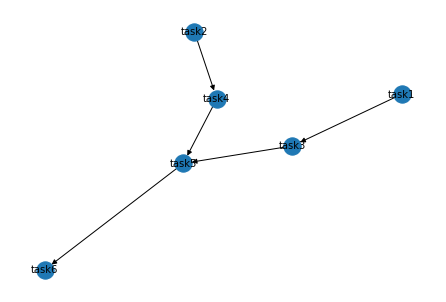Use different engines#
This notebook demonstrates how to execute a workflow with different engines.
[1]:
import os
import shutil
from ewoks import execute_graph
from ewokscore.variable import value_from_transfer
from ewokscore.tests.utils.show import show_graph
from ewokscore.tests.examples.graphs import get_graph
Select and configure a task scheduler#
[2]:
scheduler = None # select any of the schedulers shown below
execute_options = dict()
if scheduler == "dask_multithreading":
# tasks are distributed by a local scheduler over multiple threads
execute_options["engine"] = "dask"
execute_options["scheduler"] = "multithreading"
elif scheduler == "dask_multiprocessing":
# tasks are distributed by a local scheduler over multiple processes
execute_options["engine"] = "dask"
execute_options["scheduler"] = "multiprocessing"
elif scheduler == "dask_local_cluster":
# tasks are distributed by a local scheduler
execute_options["engine"] = "dask"
execute_options["scheduler"] = "cluster"
elif scheduler == "dask_remote_cluster":
# tasks are distributed by a remote scheduler
execute_options["engine"] = "dask"
execute_options["scheduler"] = "127.0.0.1:40331"
# There are different ways to start a remote scheduler
#
# Start a dask scheduler on any host:
# >>> from ewoksdask.schedulers import local_scheduler
# >>> scheduler = local_scheduler(n_workers=5)
#
# Start a dask scheduler on a host that can launch slurm jobs:
# >>> from ewoksdask.schedulers import slurm_scheduler
# >>> scheduler = slurm_scheduler(maximum_jobs=5)
elif scheduler == "pypushflow":
# tasks are distributed by a local scheduler over multiple processes
execute_options["engine"] = "ppf"
else:
# tasks are executed in a single thread
scheduler = None
pass
Select a task graph#
[7]:
taskgraph, expected_results = get_graph("acyclic1")
show_graph(taskgraph, stdout=False, plot=True)

Configure storage of results (if any)#
[4]:
def prepare_storage(clean=True):
if not varinfo["root_uri"]:
return # results are not persisted by ewoks
if clean:
shutil.rmtree(varinfo["root_uri"], ignore_errors=True)
os.makedirs(varinfo["root_uri"], exist_ok=True)
varinfo = {"root_uri": None} # folder where all results will be saved
execute_options["varinfo"] = varinfo
prepare_storage(clean=True)
Execute the workflow#
[5]:
print("Execution options:")
print(execute_options)
results = execute_graph(taskgraph, **execute_options)
Execution options:
{'varinfo': {'root_uri': None}}
Inspect results#
[6]:
for name, result in results.items():
value = value_from_transfer(result, varinfo=varinfo)
print(f" {name} =", value)
result = 16